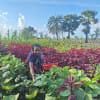How far off is climate justice for Bangladesh?

A Swiss Embassy project – Bangladesh Microinsurance Market Development Program – ranks Bangladesh as the seventh most vulnerable country in the world to the effects of climate change and fifth in the world in terms of losses incurred due to climate change. It also noted that 90 million people live in "high climate exposure risk areas" along with 53 million people experiencing "very high" exposure. It was further revealed that Bangladesh lost $3.72 billion over 20 years due to climate change.
So, how can Bangladesh get access to climate justice, from whom, and in what proportion? Or will the climate movement be limited only to meetings, sittings, and discussions?
Climate justice is described as encompassing "a set of rights and obligations, which corporations, individuals and governments have towards vulnerable people who will be disproportionately affected by climate change".
The Climate Change Knowledge Portal of the World Bank claimed that the Earth's climate is changing and the global climate is projected to continue to change over this century and beyond. With substantial reductions in greenhouse gas (GHG) emissions, the increase in global average annual temperatures could be limited to 2°C or below. However, without drastic reductions in emissions, average annual global temperatures could rise by 5°C or more by the end of the century compared to pre-industrial levels.
The greenhouse gases that contribute to climate change include carbon dioxide and methane. Agriculture, deforestation, clearing of land, land use, fossil fuel use, industries, and rapid urbanisation along with our intense dependence on luxury goods, all contribute to greenhouse gas emissions. Climate change will irreversibly modify the way we live. Coral reefs may entirely disappear. Arctic ice and glaciers will melt rapidly. Wild fires will increase. Biodiversity will be severely impacted. Climate scientists have recommended that global temperature rise should be limited to 1.5 degrees Celsius and to do this, greenhouse gas emissions should be reduced by 45 percent within 2030. Although the causes of climate change and its severe negative impacts on the environment, and the economy are widely discussed, the violations of basic human rights due to climate change have not been addressed. This seriously impedes any scope for climate justice.
The United Nations issued a "red alert" for the future of the world years ago because of climate change. Countries responsible for high carbon emissions from climate change have to provide the necessary compensation to protect Bangladesh, one of the most vulnerable nations from the threat of climate change. The country is especially vulnerable to the impacts of climate change due to overpopulation, high dependence on its limited natural resources, and vulnerable coastal belt. Acknowledging and respecting climate justice in Bangladesh needs to be seen as the basis of distributive and procedural justice.
Mohammad Anisur Rahaman is Assistant Professor of Department of Sociology at Bangabandhu Sheikh Mujibur Rahman Science and Technology University in Gopalganj.

 For all latest news, follow The Daily Star's Google News channel.
For all latest news, follow The Daily Star's Google News channel. 








Comments